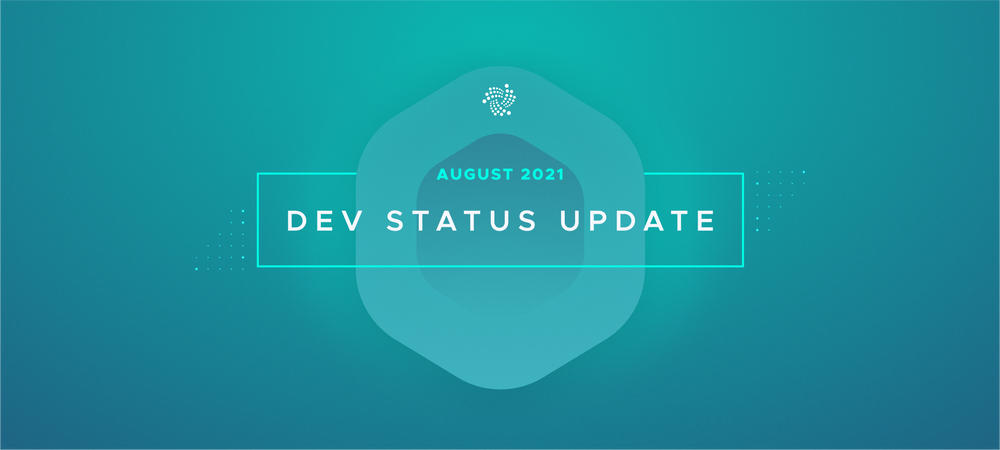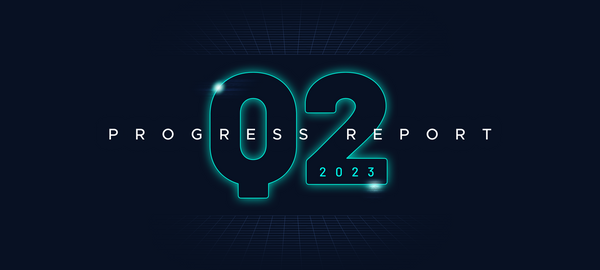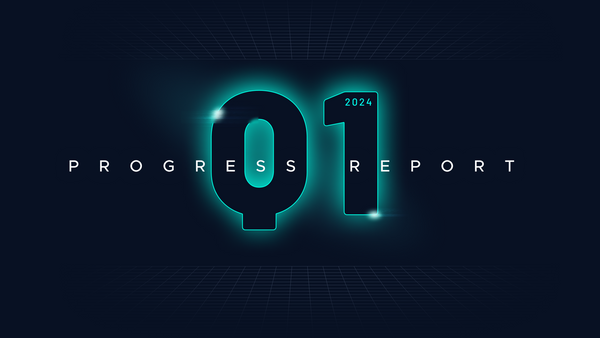Dev Status Update – August 2021
Published by the IOTA dev team every month, this update will provide you with news and updates about our key projects! Please click here if you want to see the last status update.
Chrysalis
It’s been a couple months since the successful release of Chrysalis on the mainnet. You can read all about the release here. So far, over 61% of all tokens have been migrated to the new network. Over 13% of the whole supply has been migrated in the past 3 weeks.
This is to a large extent due to the added Firefly Ledger Nano support. You can read all about the update here. Or you can check out the video we have produced showcasing how easy it is to migrate your IOTA tokens on a Ledger Nano.
Another big news is the first alpha release of the IOTA Wiki going live! Read more about that in the IOTA Experience Team section.
IOTA 2.0 DevNet
Following the successful release of the IOTA 2.0 DevNet in early June, the team has been focusing on changes to consensus and optimizations. Recently, the team has been mainly focusing on changes described in Improvements to the IOTA 2.0 Consensus Mechanism with the switch from FPC to what we call On Tangle FPC (OTFPC), and a change to choose a winner from a list of conflicting transaction instead of binary votes on each transaction. We have also released an 0.7.5 version of GoShimmer earlier this month. The team is currently also putting efforts into refactoring code regarding data serialization, plugin initialization and solidification.
To learn more about the IOTA 2.0 DevNet, check the new website, the Tangle explorer, and the developer documentation.
Bee
The Bee team has released the 0.1.0 version of the node software with the Chrysalis release and has since been working on fixes and improvements to the node software, as well as releasing an 0.1.2 version of Bee. The team has also been experimenting with a completely new plugin system adding a new storage implementation to the node. Work on a Rust version of the coordicide node, and the implementation of the new message and payload layouts as well as a network layer compatible with GoShimmer has also progressed.
Hornet
The Hornet team has released version 1.0.4 of Hornet. This version adds the autopeering functionality back to Hornet to allow you to easily participate in the Tangle. The functionality is disabled by default.
Smart contracts
Throughout the summer, the IOTA Smart Contract Protocol team has been working towards the next release which will bring programmable smart contracts to the IOTA 2.0 DevNet. All functional components for the next release have been implemented and for now it's mainly down to polishing the codebase before this new release. The current build has already successfully been tested on the Nectar testnet and even a crude working version of the EVM support was added, this integration will further evolve over the coming months. The team is now primarily focusing on testing, developer experience, documentation and small improvements to the codebase as a result of the testing sessions. Once satisfied with the outcome of these remaining tasks we'll announce a new version of ISCP running on the IOTA 2.0 DevNet, which can be tested out by anyone interested.
You can follow the updates in the #smartcontracts-discussion and #smartcontracts-dev channels on Discord.
Stronghold
We are doing the final revision of the Axtix Actor Model migration, which will be merged imminently. The P2P crate has been modified to use this new actor model paradigm, and will then be made available to dev-branch consumers of Stronghold for verification of the new system. It should be noted that the changes only really affect the Client source. Neither the interface nor the engine itself have changed.
The final modification to the internals of Stronghold that will impact consumers of the library is that we are creating a composable system that will allow for the build-time manufacture of cryptography via custom procedures. At first we will be using this internally, and then we will expose it such that it can be used in devland. When this is completed, Stronghold will be audited one more time and then the 1.0 Stable release will be published.
Firefly Wallet
Ledger Nano support was released this month in Firefly Desktop. The release went very smoothly and the team is happy to be freed up to work on other things.
Attention has now largely shifted to working on Firefly Mobile. We have a complete set of designs and so we have been able to jump right into it. Firefly has been developed in a way that makes cross-platform support (i.e. both desktop and mobile) straightforward to manage. For some things, code can be reused from Firefly Desktop in the mobile version. The core wallet logic for sending transactions and managing accounts (which is written in Rust) can be ported to the mobile version.
We do, however, need to write bindings from Rust to C then to Android and iOS respectively. Many UI components are shared between desktop and mobile meaning these can be ported over with minimal restyling. But there is of course divergence between the UI on desktop and mobile, and there will also be mobile-specific components, each of which requires some work. The more time-consuming areas of work for mobile will be on any OS related functionality and any mobile-specific features (e.g. file system for exporting Strongholds, or camera for scanning QRs). Here we will be using native APIs and cannot reuse the desktop code.
Meanwhile we are also organising an audit for the deep linking functionality in Firefly Desktop to allow community members to initiate transactions in Firefly by opening a uri from their applications. We expect to expand deep linking in the future to allow for more extensive interactions with the app.
IOTA Identity
Another month, another new team member. We were able to welcome Eike Haß to the team, a community contributor that has helped improve Selv and wrote a thesis on IOTA Identity. As a result, the team was able to update the Selv app from the old identity implementation and the legacy network to the new IOTA Identity framework, running on the mainnet. Few Self Sovereign Identity projects run on the mainnet of their respective DLTs due to fees and scaling concerns, therefore we are proud to be able to do this without any issues.
The team also progressed its development of IOTA Identity Actor, extending the foundational Actor logic and researching the DID Communications specifications to prepare for implementations. We released an ELI5 style blog post explaining why we are developing the Identity Actor and how it functions, if you haven't already, we highly recommend giving it a read. Lastly, the team has been working on extending the IOTA Explorer to include a DID Resolver. We expect this will be a very useful tool for developers to test their identity projects with.
Chronicle
The team has been busy making fixes to the Chrysalis version of Chronicle. We are now working on a specification for the selective permanode functionality. Once we have a design we are satisfied with, we will share it externally for further input.
IOTA Experience Team
X-Team member Stefan Braun from IOTA.php announced that the 100% community driven IOTA PHP library, available here, will integrate IOTA Identity in the next alpha version. Support the project by following IOTA.php on Twitter and adding a star to the repository on GitHub!
Simplify X-Team member Linus published a series of posts on Reddit and Medium about IOTA which are totally worth a read:
Reddit:
- Reality as a social construct – How IOTAs most radical tech-decisions aim to disrupt the DLT space
- The hidden goldmine: “No-coin DLT” and IOTAs feeless data-transactions
Medium:
- Unpopular opinion: Bitcoin did not get rid of the middle-man
- A future day with IOTA — Part I
- Parallel realities and IOTAs breakthrough “Multiverse consensus”
And Brennan published a Twitter thread and the insightful Layer One series available at iologica
“Layer One is a three-part philosophical journey into the emergence and implications of the IOTA distributed ledger technology and its parallel reality based data structure.”
mpochert2, X-Team member and prolific mobile developer improved the HORNET Node Manager app for iOS and Android.
X-Team member NO8ODY and manager of the TANGLE BAY released the v0.6.8 of SWARM an IOTA node management script.
"SWARM is a script that allows you to easily install and manage an IOTA node. The most important configuration options are given via simple and selectable menu items. About the additional feature "Watchdog", the status of the nodes can be monitored, as well as automatically install updates. A reverse proxy installation is also offered for secure access via HTTPS."
And last but not least, the first alpha release of the X-Team and community driven IOTA Wiki is online!
Dr. Electron, adamski, Phylo and Jeroen van den Hout proudly present the first alpha release of the IOTA wiki. Built by the community for the community. The wiki is at an early stage, and your contribution would be really appreciated. Jeroen has built a great in-page editor, which makes it easy to contribute to the wiki content without being a GitHub expert. You will however need a GitHub account.
The wiki will be a one-stop shop for IOTA information. Let's BUIDL it together!
As always, we welcome everyone to stop by on Discord — every project mentioned here has a channel (or more) for discussion with the devs!
Follow us on our official channels!




